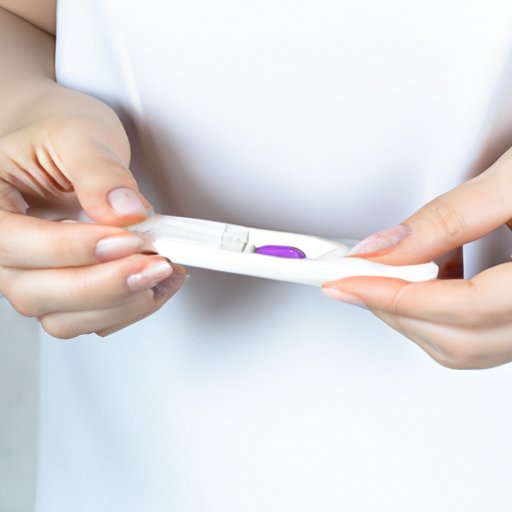Introduction
Pregnancy tests are an important tool for determining whether or not a person is pregnant. It is essential to understand the different types of tests available, as well as the best time frame for taking a test in order to receive the most accurate results. This article explores when the best time to take a pregnancy test is, in order to provide helpful guidance for those who are considering taking one.

Analyzing the Different Types of Pregnancy Tests and When to Take Them
There are two main types of pregnancy tests: home pregnancy tests and doctor’s office tests. Home pregnancy tests are typically done at home with a kit purchased from a pharmacy or drug store. These kits usually come with instructions for how to use them properly and accurately. The advantage of using a home test is that it can be done in the privacy of one’s own home and is typically less expensive than a doctor’s office test. However, it is important to note that these tests are not as accurate as a doctor’s office test, so if the results are positive, it is recommended to follow up with a doctor to confirm the results.
Doctor’s office tests are typically more accurate than home tests, but they also tend to be more expensive and require a visit to the doctor’s office. These tests are usually done through a blood sample or urine sample and are often more reliable than home tests. The benefit of taking a test in a doctor’s office is that the results will be more accurate and a doctor can provide further guidance or advice if needed.

Examining the Best Time Frame for Taking a Pregnancy Test
The best time frame for taking a pregnancy test depends on several factors, including when conception occurred and the type of test being taken. Generally speaking, it is recommended to wait until at least one week after a missed period before taking a test. This is because hCG levels, which are the hormones that indicate pregnancy, do not become detectable in urine until a few days after implantation of the fertilized egg in the uterus. Therefore, waiting until after a missed period will ensure that the test results are more accurate.
It is also important to note that different types of tests may have different windows of accuracy. For example, some home pregnancy tests can detect hCG levels as early as seven days after conception, while others may not be able to detect hCG levels until 14 days after conception. Therefore, it is important to read the directions of the test carefully in order to determine the best time frame for taking it.
Investigating the Accuracy of Pregnancy Tests at Different Stages of Pregnancy
The accuracy of pregnancy tests can vary depending on the stage of pregnancy. Generally speaking, tests are more accurate during the early stages of pregnancy. This is because hCG levels increase rapidly during the first trimester, making it easier for tests to detect the hormone. Tests are also more accurate during the later stages of pregnancy, as hCG levels remain elevated throughout this time.
However, it is important to note that the accuracy of tests can also be affected by other factors, such as the sensitivity of the test and the amount of water consumed prior to taking the test. Therefore, it is important to follow the instructions of the test carefully in order to ensure the most accurate results.
Conclusion
In conclusion, the best time to take a pregnancy test depends on several factors, including the type of test used and when conception occurred. Home pregnancy tests are convenient and typically less expensive, but they are not as accurate as doctor’s office tests. In general, it is recommended to wait until at least one week after a missed period before taking a test in order to get the most accurate results. Tests are also more accurate during the early and later stages of pregnancy, so it is important to consider timing when deciding when to take a test. Following the instructions of the test carefully can also help to ensure the most accurate results.


